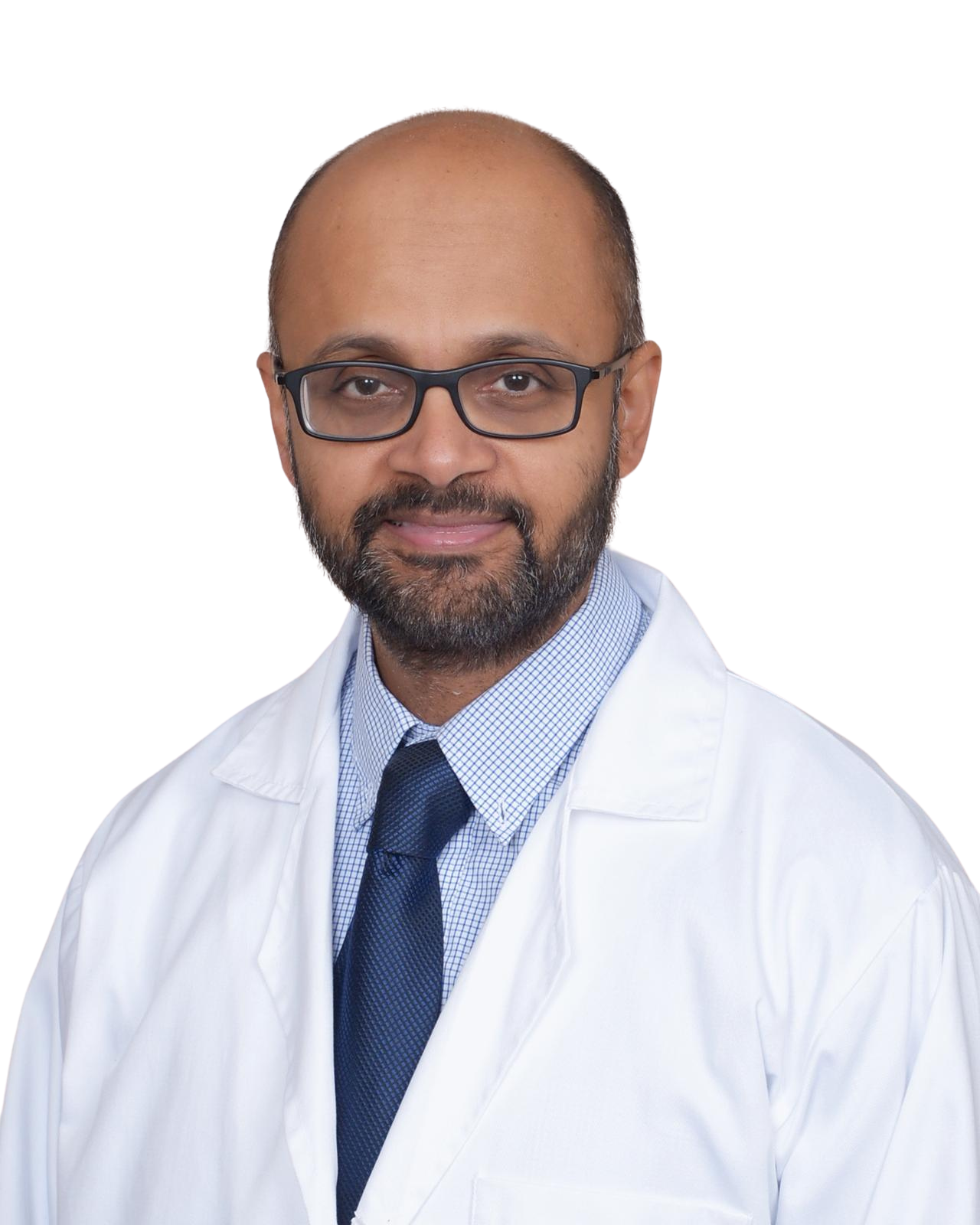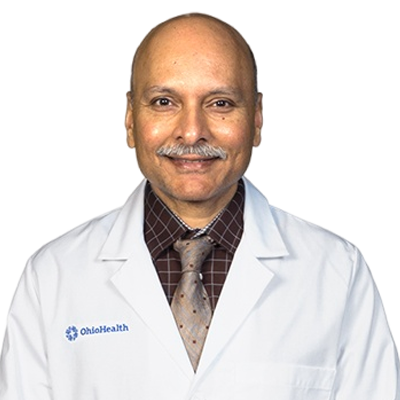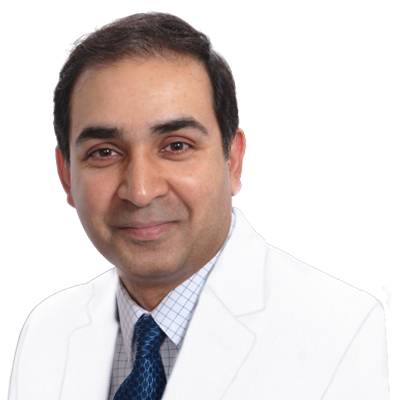Dr. Deepak Thomas:
General Cardiology & Advanced Cardiac Imaging
MyAmericanDoctor offers patients access to expert opinions from US doctors across almost all medical specialties,
eliminating the need for costly and time-consuming travel.

About the Doctor
Dr. Deepak Thomas is a board-certified cardiologist practicing in the United States with extensive expertise in diagnosing, treating, and managing a broad spectrum of cardiovascular conditions. His training in the U.S. healthcare system has equipped him with the latest knowledge and developments in cardiology. He recently conducted a live session discussing various cardiovascular diseases, including heart failure, atrial fibrillation, heart attacks, and hypertension. This blog highlights the key takeaways from this session where he addressed common concerns related to heart health.
1. Many people in India who have had a heart attack and undergone medical procedures like coronary stent placement feel better physically but are still worried about their heart health. Some may seek advice from top US cardiologists on the latest cardiovascular care developments. What are some key takeaways related to heart attacks?
Heart attacks especially at a younger age are more prevalent among Indians and South Asians when compared to other ethnicities, like Caucasians or Chinese. The increased risk is partly related to genetics, diet, lifestyle, and possibly lower levels of physical exercise. Managing risk factors is even more important for people who have already had a heart attack. While regular exercise and a balanced diet remain essential for maintaining overall health, greater emphasis must be placed on reducing risk factors and adhering to prescribed medications to prevent future cardiac events.
The treatment approach for coronary artery blockages depends on their severity and location. Often, doctors may place a stent or bypass surgery to restore blood flow. However, extensive blockages can increase the risk of future heart attacks and may require additional interventions. A comprehensive treatment plan often includes cholesterol-lowering medications, antiplatelet drugs, and lifestyle modifications.
Dr Deepak emphasizes the importance of cardiac rehabilitation after a heart attack, which is widely recommended in the U.S. These structured programs involve professionally supervised exercise sessions, where patients’ vital signs, such as blood pressure, heart rate, and ECG, are closely monitored to ensure safe recovery in the early stages after a heart attack.
Long-term treatment strategies also depend on factors such as the heart’s pumping efficiency, measured by ejection fraction. Ultimately, managing cholesterol, blood sugar if diabetic, adhering to prescribed medications, and maintaining a healthy diet and exercise routine are essential for reducing long-term risks and improving overall heart health.
2. Even under the care of an excellent doctor, the diagnosis of heart failure in a loved one can be concerning. How can one stay informed about the latest advancements in cardiac care, particularly from renowned specialists in the US?
Heart failure, also known as cardiomyopathy, is generally classified into two main types. The first type occurs when the heart muscle becomes weakened and is unable to pump blood efficiently. This weakness can be caused by factors such as heart attacks, viral infections, excessive alcohol consumption, drug use, or certain genetic conditions.
The second type of heart failure develops when the heart muscle becomes stiff over time. Normally, the heart functions like a balloon, expanding as it fills with blood and contracting to pump it out. In this condition, however, the heart loses its elasticity, becoming rigid and unable to expand properly. This increases pressure within the heart, leading to symptoms such as shortness of breath and swelling in the extremities.
Many people don’t know they have heart failure until it gets much worse. They often mistake signs like shortness of breath for asthma or other lung problems. Be vigilant for symptoms such as persistent shortness of breath, unexplained swelling in the legs or abdomen, and unexpected weight gain without changes to your diet. Early recognition of these symptoms and getting medical advice can make a significant difference in how well heart failure is managed.
Figuring out the exact type of heart failure is important for managing it properly. If the heart isn’t working well, doctors often prescribe medicines to help it get better. Furthermore, it’s important to check if the coronary arteries are blocked, since heart muscle weakness can happen when blood flow is limited. It may be necessary to do tests like cardiac ultrasound, also called echocardiograms, heart catheterization, or stress tests.
Along with prescribed medications, it’s important to introduce changes to your diet and do regular exercise. In India, high salt consumption is common and can lead to water retention, which may worsen symptoms of heart failure, such as shortness of breath. Managing these symptoms can be more effective by reducing salt and fluid intake.
Treatment options for heart failure vary based on the patient’s condition and the severity of the disease. In advanced cases, additional interventions may be required alongside medical therapy, including implantable defibrillators, artificial heart support systems, or even heart transplantation.
3. Why are more people experiencing heart attacks nowadays in India, and why is the percentage continuing to rise?
Dr. Deepak Thomas explains that while heart attacks have occurred throughout history, the ability to diagnose them was limited in the past. Many cases likely went undetected because individuals experiencing symptoms often did not have access to medical evaluations. It was not uncommon to hear about seemingly healthy individuals dying suddenly. However, without autopsies, the exact cause of death frequently remained unknown.
More people in India now go to the doctor when they have chest pain, leading to a high number of diagnosed cases. This implies an increase in the number of identified cases. Lifestyle changes serve as another important factor. People used to do more physical work, like working in fields or just being busy in general. Dr Deepak also mentions the rising number of cases of heart disease in people who are working in offices and have a sedentary or stressful lifestyle.
Today, many office jobs require prolonged periods of sitting, leading to reduced physical activity. Additionally, the rising incidence of heart disease is influenced not only by genetic factors but also by lifestyle changes, including the growing consumption of Western foods in India. The risk of heart attacks continues to increase without proper attention to diet, regular exercise, and healthy lifestyle choices.
4. When your loved one is diagnosed with atrial fibrillation, understanding the latest advancements in its management becomes important. What are the latest treatment options and lifestyle recommendations from expert cardiologists?
Atrial fibrillation (AFib) is a type of heart rhythm abnormality that occurs when the heart’s electrical signals originate from multiple points in the atria rather than from the sinus node, the primary electrical source located in the upper right chamber of the heart. In a healthy heart, these signals follow a rhythmic pattern. However, in AFib, they fire irregularly, causing the heart to beat erratically and often at an increased rate.
As people age, scarring and changes in the heart’s electrical system become more common. A normal resting heart rate typically ranges between 60 and 100 beats per minute. However, in individuals with atrial fibrillation (AFib), the heart rate can suddenly spike to 130 or 140 beats per minute, or higher even without physical activity or stress.
Due to sluggish blood flow in the heart’s upper chambers during AFib, there is an increased risk of blood clot formation. These clots can travel to the brain and, in some cases, cause a stroke. To lower this risk, most patients with AFib are prescribed blood thinners, unless contraindications exist, such as a history of bleeding or a high risk of falls.
Medications that help control heart rate and rhythm are a key part of atrial fibrillation (AFib) treatment. Dr Deepak Thomas also highlights procedures like electrical cardioversion, which delivers an external shock to restore the heart’s normal rhythm. However, cardioversion typically provides only short-term relief and is not a long-term solution.
In the past, antiarrhythmic medications were the primary method for maintaining normal heart rhythm. With advances in medical technology, catheter ablation has become a more effective and widely used procedure. This technique involves targeting and cauterizing specific areas of the heart muscle that are generating abnormal electrical signals. As technology continues to improve, ablation is increasingly successful in treating AFib and significantly enhances the likelihood of maintaining a normal heart rhythm.
5. What are the effective strategies for managing high blood pressure, especially for young adults, and what are the long-term implications of this condition?
High blood pressure significantly increases the risk of heart disease, stroke, kidney failure, and even vision loss, making proper management essential. While medications are often necessary, lifestyle changes play an equally critical role. Reducing salt intake is particularly important, as excessive sodium can raise blood pressure.
Dr. Deepak Thomas emphasizes the role of stress management, noting that chronic stress and anxiety elevate adrenaline levels, which can contribute to high blood pressure and other health issues. Stress can be alleviated through practices such as meditation, breathing exercises, maintaining a supportive work environment, and regular physical activity.
Additionally, Dr. Deepak highlights the link between high blood pressure and obstructive sleep apnea (OSA), a condition that causes daytime fatigue and excessive sleepiness. OSA often requires evaluation and treatment to help control blood pressure. In some cases, managing hypertension may require the use of more than two or three medications.
Emerging treatments, such as renal nerve ablation, are being explored for resistant hypertension, though they are not yet widely available. Regular monitoring at home using a reliable blood pressure machine is essential, with readings taken while relaxed and in the correct posture. Ideally, blood pressure should be maintained below 130/80 mmHg. Consistently high readings indicate the need to consult a healthcare provider.
Conclusion:
U.S.-trained doctors can review and evaluate the medical care of patients globally, offering reassurance about their current treatment or providing information on alternative and advanced treatment options available both locally and globally.
If you or a loved one would like to consult one of our doctors, please visit our website, MyAmericanDoctor.com, to book an appointment. Our team includes specialists in all major medical and surgical fields, including cardiology, oncology, neurology, gastroenterology, neurosurgery, and heart transplants.
We are committed to providing expert medical guidance and support, empowering you to make informed healthcare decisions—all from the comfort of your home in India.
Related Sessions


